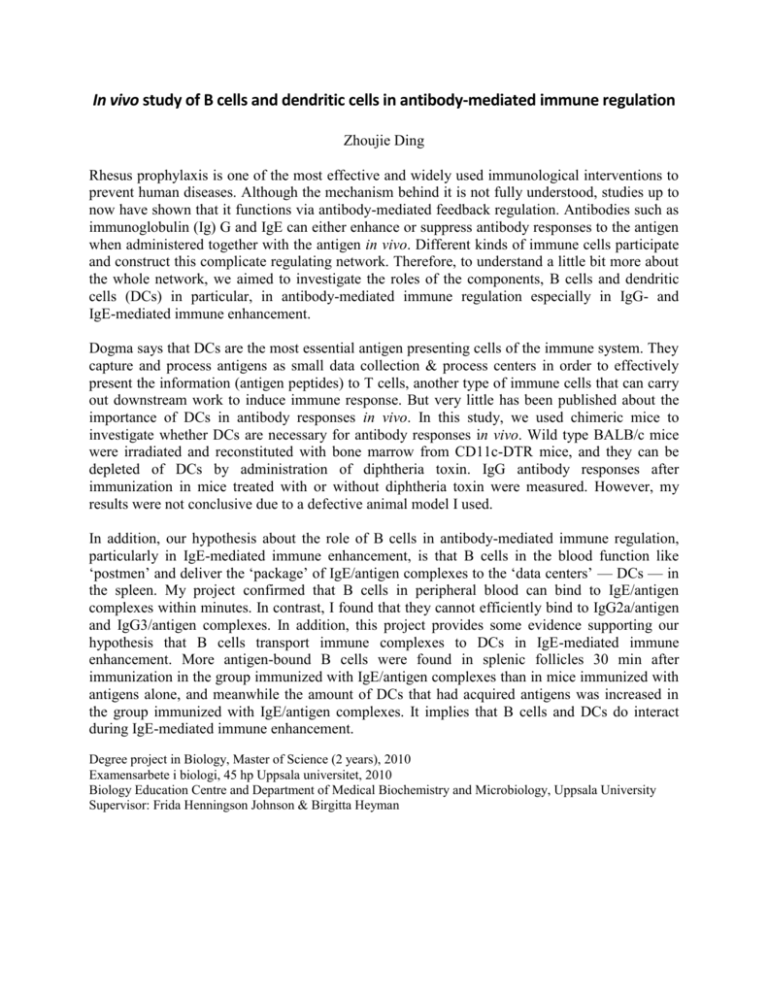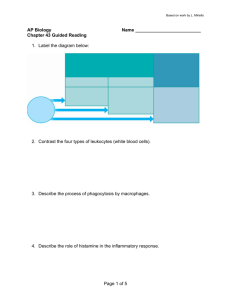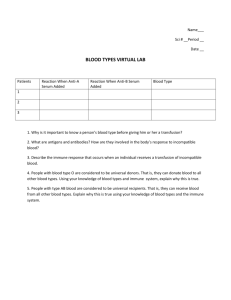In vivo study of B cells and dendritic cells in antibody
advertisement

In vivo study of B cells and dendritic cells in antibody-mediated immune regulation Zhoujie Ding Rhesus prophylaxis is one of the most effective and widely used immunological interventions to prevent human diseases. Although the mechanism behind it is not fully understood, studies up to now have shown that it functions via antibody-mediated feedback regulation. Antibodies such as immunoglobulin (Ig) G and IgE can either enhance or suppress antibody responses to the antigen when administered together with the antigen in vivo. Different kinds of immune cells participate and construct this complicate regulating network. Therefore, to understand a little bit more about the whole network, we aimed to investigate the roles of the components, B cells and dendritic cells (DCs) in particular, in antibody-mediated immune regulation especially in IgG- and IgE-mediated immune enhancement. Dogma says that DCs are the most essential antigen presenting cells of the immune system. They capture and process antigens as small data collection & process centers in order to effectively present the information (antigen peptides) to T cells, another type of immune cells that can carry out downstream work to induce immune response. But very little has been published about the importance of DCs in antibody responses in vivo. In this study, we used chimeric mice to investigate whether DCs are necessary for antibody responses in vivo. Wild type BALB/c mice were irradiated and reconstituted with bone marrow from CD11c-DTR mice, and they can be depleted of DCs by administration of diphtheria toxin. IgG antibody responses after immunization in mice treated with or without diphtheria toxin were measured. However, my results were not conclusive due to a defective animal model I used. In addition, our hypothesis about the role of B cells in antibody-mediated immune regulation, particularly in IgE-mediated immune enhancement, is that B cells in the blood function like ‘postmen’ and deliver the ‘package’ of IgE/antigen complexes to the ‘data centers’ — DCs — in the spleen. My project confirmed that B cells in peripheral blood can bind to IgE/antigen complexes within minutes. In contrast, I found that they cannot efficiently bind to IgG2a/antigen and IgG3/antigen complexes. In addition, this project provides some evidence supporting our hypothesis that B cells transport immune complexes to DCs in IgE-mediated immune enhancement. More antigen-bound B cells were found in splenic follicles 30 min after immunization in the group immunized with IgE/antigen complexes than in mice immunized with antigens alone, and meanwhile the amount of DCs that had acquired antigens was increased in the group immunized with IgE/antigen complexes. It implies that B cells and DCs do interact during IgE-mediated immune enhancement. Degree project in Biology, Master of Science (2 years), 2010 Examensarbete i biologi, 45 hp Uppsala universitet, 2010 Biology Education Centre and Department of Medical Biochemistry and Microbiology, Uppsala University Supervisor: Frida Henningson Johnson & Birgitta Heyman







